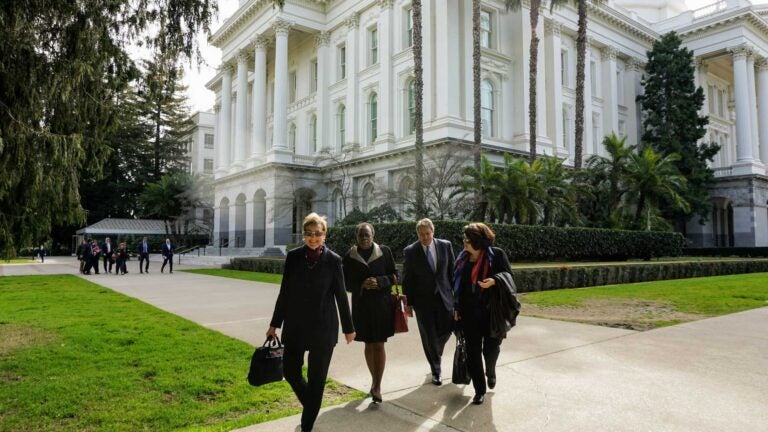
Wanda Austin and other members of USC leadership met with lawmakers in Sacramento. (USC Photo/Eric Abelev)
USC President Austin leads Sacramento delegation to support Cal Grants
The delegation, which included trustees and senior administrators, met with lawmakers and also celebrated the USC Price School’s 90th anniversary
USC interim President Wanda M. Austin led a delegation that included trustees Suzanne Dworak-Peck and Chris Cox to Sacramento on Wednesday to advocate for Cal Grants for students attending private nonprofit institutions like USC.
While Cal Grants — the primary state funding mechanism for low- and middle-income students in California — have steadily risen for those attending California’s public institutions, the awards have decreased by 40 percent since 2000 for those who enroll in private universities like USC.
The USC delegation urged lawmakers to support upcoming legislation being introduced by Assembly member Blanca Rubio to establish a fair formula for Cal Grants awarded to students attending private universities. If passed, it would raise the current award to $11,434 from $9,084.
We don’t want to see students being penalized for choosing a private university like USC.
Wanda M. Austin
“The reason we are asking lawmakers to support the Rubio legislation is simple,” Austin said. “The Cal Grant award goes to the student, not the institution, and we don’t want to see students being penalized for choosing a private university like USC. Students from low-income backgrounds deserve to have access to the same spectrum of choice for their college education.”
The delegation, which included senior staff members David Brown, Martha Escutia, Dennis Cornell and Janet Lopez, outlined an important argument for why this investment is worth making. The total four-year cost to the state to fund a Cal Grant student at a private, nonprofit university like USC would be $45,736 if the Rubio bill is passed. That’s far less than the $115,072 it costs to support a Cal Grant student who enrolls at a University of California institution, since the in-state tuition of a state college or university is subsidized by taxpayers.
USC officials visit Sacramento, note high number of Trojans receiving Cal Grants
“This issue is important for USC because we enroll over 2,500 Cal Grant recipients – more than any other private nonprofit university in California,” said Brown, USC interim senior vice president for university relations. “In addition, nearly three-quarters of USC’s Cal Grant recipients are under-represented minorities, and more than half are first-generation college students. But what we’re most proud of is that our Cal Grant awardees graduate at a rate of 94 percent — even higher than the 92 percent graduation rate of our overall student body.”
USC’s delegation delivered its message in meetings with Assembly speaker Anthony Rendon, Assembly members Reggie Jones-Sawyer and Jose Medina, as well as Sens. Maria Elena Durazo, Robert Hertzberg, Anthony Portantino and Richard Roth.
“I was pleased by the warm reception our appeal received, and remain optimistic that the full spectrum of choice can be restored for Cal Grant recipients,” Austin said.
USC Price School anniversary marked as USC officials visit Sacramento
Following a full day of meetings, Austin joined USC Price School of Public Policy Dean Jack Knott in hosting a celebration to mark the 90th anniversary of the school. USC Price has steadily risen in academic rankings and is now the No. 2 public policy school in the nation, according to U.S. News & World Report. USC Price enjoys a strong support base in Sacramento, having educated many of the state’s top policy-makers, researchers and political leaders.



